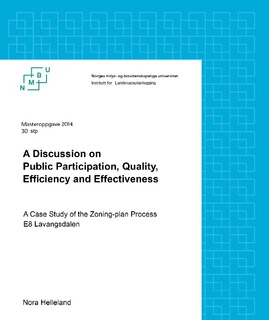A discussion on public participation, quality, efficiency and effectiveness
Master thesis
Permanent lenke
http://hdl.handle.net/11250/217445Utgivelsesdato
2014-08-18Metadata
Vis full innførselSamlinger
- Master's theses (ILP) [763]
Sammendrag
This master thesis is a contribution to the debate about the inefficiency of road planning in Norway. Statens Vegvesen aims at halving the time spent on planning and have put forwards several efficiency enhancing measures. The planning regime in Statens Vegvesen is developing towards a system which is more pressured on time delivery. This thesis highlights and discusses the effects that time-pressure involves with respect to public participation and quality of both planning processes and produced plan. The Norwegian word effektivitet holds two different meanings in English: efficiency and effectiveness. The thesis discusses this duality in order to understand what the term effektivitet entails in relation to the on-going efficiency enhancing process in Statens Vegvesen. The method that has been used is a case study of the time-pressured zoning-plan process of E8 Lavangsdalen. The characteristics of the planning process and the produced zoning-plan have been compared to ideals from theories on planning.
The case study revealed that the planning process, due to time-pressure, failed to perform in accordance with required guidelines and planning ideals. This resulted in an overall reduction of quality in both process and plan. Furthermore, the poor quality of the plan resulted in misinforming the citizens. The planning process of E8 Lavangsdalen is highlighted as one of the most efficient planning processes ever performed by Statens Vegvesen. However, the case study revealed that the planning process was neither efficient nor effective.
The main finding of the case study is that the quality of plan and planning process is dependent on allocating enough time and resources to perform the first stages of a planning process.
